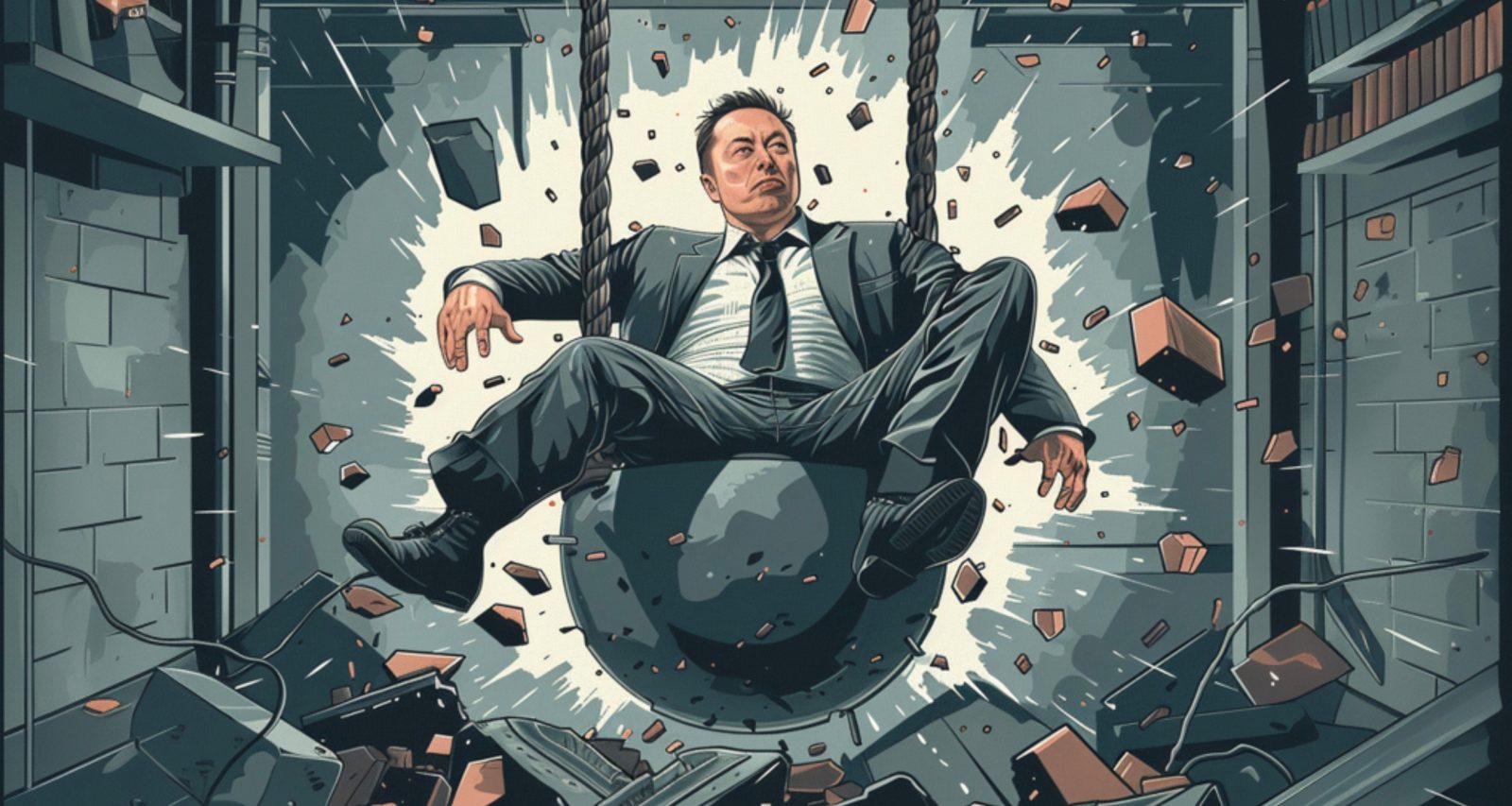
Tesla CEO Elon Musk managed to find a way to turn lobbying, which is typically one of the most efficient ways to spend money as a company, into a net revenue loser for his company – flipping the script again from a true “innovator” in the field of corporate destruction.
Tesla released its 10-Q filing today, to supplement its Q3 shareholder letter and conference call from yesterday’s quarterly report.
The filing gives us more detail about what’s going on with Tesla’s financials, namely, how Tesla managed to have record revenue last quarter and yet still have a 40% drop in operating income from the year-ago quarter.
One explanation for this drop is lost revenue from regulatory credits. Regulatory credits have been a relatively stable portion of Tesla’s earnings over the years, as it is one of few companies producing more electric vehicles than it is legally required to.
What are regulatory credits?
Several governments have committed to reducing pollution, and one way that they can do so is by requiring automakers to make less-polluting vehicles.
Generally, if an automaker fails to meet the guidelines set up by government, they have to pay a penalty for polluting the air too much and harming everyone with that pollution. Or, instead of paying that penalty, they can buy credits from a company that exceeded the guidelines, thus transferring money from the companies that are doing a bad job to the companies that are doing a good job.
Every government has a slightly different way of implementing requirements and credit swaps, but this is generally how it works on a high level.
Put aside for the moment that these penalties, or the cost of credit swaps, are almost always far lower than the actual amount of damage done by pollution, this is at least one method that governments can and have used to try to encourage cleaner air and lower health costs for the populations they govern.
Rules changed by republicans to cost you more money
That is, until the republican party came along. Buried in the $4 trillion giveaway to wealthy elites passed by republicans earlier this year was another provision to reduce the cost of regulatory fines in the US to $0.
Congress could not legally eliminate the fines, since they are mandated by the Clean Air Act, and republicans in Congress didn’t want to modify the Clean Air Act because it would be more obvious to everyone that they want dirty air, and because they didn’t have the votes to do so. But they did have the votes to do an end-run around democracy and eliminate the fines, which makes the regulation effectively useless.
So now, automakers have less incentive to work on making their cars more efficient. This means you’ll be buying more gasoline, that gas prices will go up (and the increased price won’t go to any social good, but rather to line oil companies’ pockets), and that you’ll suffer from more air pollution which leads to higher health costs for everyone.
When, in contrast, President Biden had strengthened this rule, just the modifications made by his administration were estimated to save $600-700 over the lifetime of each vehicle, or $23 billion in total across the US. But that’s only from Biden’s improvement of this specific rule; the rule in total saves much more, in comparison to not having the rule at all.
But what does this all have to Elon Musk?
Elon Musk lobbied to have these rules removed, harming his company
During the 2024 US election, Elon Musk spent a total of $288 million on bribes to get anti-EV candidates elected. He did this despite full public knowledge that these candidates opposed electric vehicles, and had promised to harm them.
But, due to Musk’s social media addiction to his bizarre upside-down twitter feed, he and many others convinced themselves that somehow, harming EVs would be good for an EV company.
So, Musk spent the millions, got what he wanted, claims it was all because of him (egotistical much?), and as a result, his company… is worse off.
According to the company’s 10-Q filing, Tesla lost $1.41 billion worth of revenue in just the last 9 months that it would have had if not for changes in regulatory regimes. Here’s the passage, in financial speak:
Automotive Regulatory Credits
As of September 30, 2025, total transaction price allocated to performance obligations that were unsatisfied or partially unsatisfied for contracts with an original expected length of more than one year was $3.27 billion. Of this amount, we expect to recognize $877 million in the next 12 months and the rest over the remaining performance obligation period. Changes in regulations on automotive regulatory credits may significantly impact our remaining performance obligations and revenue to be recognized under these contracts. In 2025, governmental and regulatory actions have repealed and/or restricted certain regulatory credit programs tied to our products, contributing to the $1.41 billion decrease in our remaining performance obligations as of September 30, 2025 compared to December 31, 2024.
Translated, that means that the value of Tesla’s various contracts to sell regulatory credits to other companies has reduced by $1.41 billion dollars as compared to where they were at the end of last year. Tesla says that the specific reason for this is due to the change in regulatory credits that its bad CEO lobbied for.
Tesla also suffered reduced profitability over the course of the quarter due to increased tariff costs, but does not quantify the amount lost to this. So the losses are certainly more than $1.4 billion.
Some could argue that the value of Musk’s lobbying was to get a foot in the door, and to be able to influence republicans to do less anti-EV stuff than they might have otherwise done, but that hasn’t turned out to be the case. There is no indication that republicans have softened their anti-EV position, and in fact, they keep doubling down on trying to harm you and ignoring science. And besides, Musk hasn’t even maintained any relationships, after a very public breakup.
So, somehow, Musk managed to turn lobbying spend from one of the most efficient possible ways a corporation can spend money, into one of the most inefficient ways.
Lobbying is generally highly efficient spend; Musk flips the script again
Normally, lobbying is considered an incredibly efficient way for companies to make money. Various analyses have suggested that the average return on investment from lobbying dollars is anywhere between 22,000% and 104,000%. (Yes, this is a problem, but it’s not what we’re discussing at the moment).
However, in this case, lobbying produced a loss of 489% of the money spent – and that’s just counting the losses caused in the last 9 months, and only in regulatory credits. Those credits would have been pure profit, too, with no cost of revenue associated with them, so this is just a straight loss of money for the company and its shareholders.
In addition to those losses, there’s the lost revenue from vehicle sales. While this has not yet been recognized by the company, going forward Tesla sales will experience a dip now that all of Tesla’s automotive and home energy products – essentially, all of the products that Tesla sells – have been made more expensive in the US due to political changes.
Either Tesla can choose to lower prices to maintain post-credit pricing and take a hit to margins of $7,500 per vehicle and 30% on home energy products, or it can hold prices the same and lose customers due to lower affordability of its products… or it can release subpar, long-promised products that cost more and are worse than the thing they’re replacing.
Needless to say, none of these options are great for business.
And so, since vehicle credits didn’t end until the end of Q3 (causing a pull-forward in demand, which is the main reason for record deliveries), and since home energy credits go away at the end of this coming quarter (and if you want your last chance to get in before they do, get started here), that means business going forward from this quarter will be even worse than the last few dismal quarters have been.
In addition to lost revenue from credits, there is another issue which is more difficult to track, but is definitely happening.
That is the issue of brand damage that Musk’s political activities have had on the company. Tesla is the only EV brand with negative perception, and it’s directly correlated to Musk’s political activities. His actions haven’t just harmed Tesla domestically, but abroad, where the company has lost business opportunities in in the UK, Australia, Germany, Denmark, and has seen falling sales in most territories, along with protests and embarrassed owners.
Tesla has already lost a lot of sales and will lose more, which means less revenue, and less profit. That $1.41 billion is just a start.
Despite directly harming Tesla, Musk wants you to pay him $1 trillion to stay on
Despite this horrendously inefficient use of funds by a CEO who has shown time and time again that he is outright hostile to the company he spends a small portion of his time running, Musk has also directed the company to spend more funds on an advertising effort to give him up to $1 trillion worth of Tesla stock.
The trillion-dollar number takes into account some optimistic stock growth for the company (which is unlikely given Musk’s recent performance as CEO, where earnings have dropped precipitously), but is still around 40x more than Tesla has ever made over its entire history. It would be the largest CEO payday in history by multiple orders of magnitude.
Regardless of whether stock appreciates enough to give Musk all the shares covered under the plan, there is still room in the proposals for him to be granted well over 200 million newly printed shares of stock (worth around $90 billion) for doing nothing whatsoever, leading to dilution of voting rights and share value for current shareholders. The plan gives Musk’s personal friends on Tesla’s board significant discretion in this matter, and saddles the company with his poor leadership for another decade.
It would also give him a huge source of wealth, which he could turn into cash, to spend on other lobbying activities to harm Tesla’s business, as he has proven above that he is happy to do. If Musk can manage to lose Tesla $1.41+ billion with $288 million, imagine what he could do with $1 trillion.
The 30% federal solar tax credit is ending this year. If you’ve ever considered going solar, now’s the time to act. To make sure you find a trusted, reliable solar installer near you that offers competitive pricing, check out EnergySage, a free service that makes it easy for you to go solar. It has hundreds of pre-vetted solar installers competing for your business, ensuring you get high-quality solutions and save 20-30% compared to going it alone. Plus, it’s free to use, and you won’t get sales calls until you select an installer and share your phone number with them.
Your personalized solar quotes are easy to compare online and you’ll get access to unbiased Energy Advisors to help you every step of the way. Get started here.
FTC: We use income earning auto affiliate links. More.
Source link

